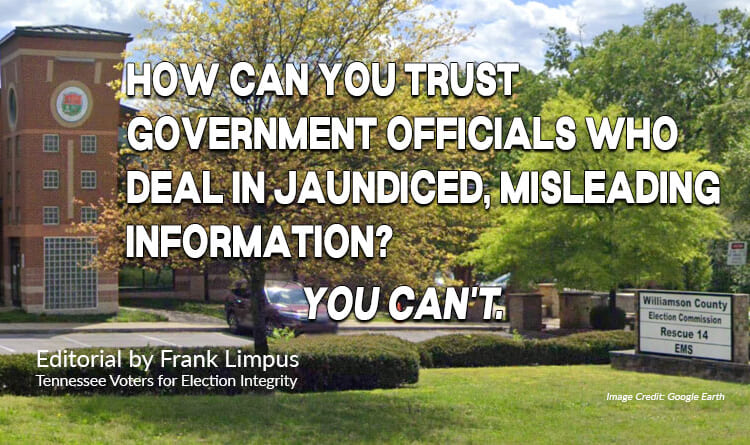Image Credit: Google Earth
Submitted by Frank Limpus [Tennessee Voters for Election Integrity] –
Last summer, the Williamson County Election Commission (WCEC) offered biased and misleading information about election machines in order to sway the Williamson County Commission to approve a resolution to purchase ES&S voting machines with county, state and federal taxpayer money.
So, in December a group of Williamson County citizens went before the Tennessee State Election Commission (SEC) and followed it up last night before the Williamson County Board of Commissioners to seek the appointment of new, more ethical, unbiased representation to the WCEC who could better fulfill their oaths and begin to return the public’s trust in the WCEC.
On May 4, 2023, the election commission wrote a letter discussing their desire for purchasing new voting equipment and went before the County Commission on May 8, 2023 to seal the deal. At that meeting, County Commissioners voted against approving the allocation of county, state and federal taxpayer dollars for the purchase. But by the County Commission’s June 12, 2023 meeting, the WCEC had sweetened the pot, suggesting they pursue a feasibility study adding hand-marked paper ballots (HMPBs) to the county’s election process. A majority of the Commission approved the request.
Following a thorough review of the WCEC’s letter and remarks at the two meetings – where voters were not allowed to refute WCEC’s comments – a group of citizens identified a number of misleading, biased statements, mischaracterizations, inaccurate citing of sources, unbalanced evaluation of options and general lack of objectivity in what the WCEC told the County Commission. The WCEC stated that purchasing the equipment made far better sense than bringing in hand-marked paper ballots (HMPBs), which, actually, are used by more than two-thirds of America.
Contrary to what the WCEC said, several of its own sources told an entirely different story.
Citizens spent hundreds of hours studying the materials and developed a “Citizen’s Truth Review,” a two-page chart detailing what the WCEC said and the truth behind each point that they didn’t say. The striking aspect of the report is the number of sources and footnotes citizens cited.
County Commissioners can’t be experts on every subject and must rely on county staff and commissions to present unbiased information. That’s especially important when taxpayer money is involved. All three WCEC communications became examples of distorted information to achieve a goal of acquiring voting machines, despite the valid concerns expressed by citizens over several years.
What were a few of the prejudiced WCEC statements?
After asserting why they felt HMPBs are bad, the election commission told Commissioners the National Academies of Science, Engineering and Medicine’s 2018 Consensus Study recommends using ballot marking devices for voting. Yet they neglected to report that the study went on to say that hand-marked paper ballots are recommended for voters. In fact, the report further affirms that voter-hand-marked paper ballots are the standard to be used in voting.
In addition to their misleading statements, the WCEC omitted that numerous cyber experts strongly support hand-marked paper ballots in place of ballot marking devices.
In another instance, WCEC Chairman Jonathan Duda discussed inspecting 150 absentee ballots in an election to determine voter intent so the ballots could be cast. Because errant marks on the absentee ballots were confusing, and the voters weren’t present to decipher them, the WCEC had to disqualify the ballots and, for that reason, Duda said he couldn’t recommend HMPBs.
But his example concerned absentee ballots, not precinct ballots. In a precinct, during early voting or on election day, every tabulator forces questionable ballots to be adjudicated by the voter right then and there before being counted. Again, distortion that, no doubt, confused County Commissioners in their deliberations.
The appearance before both the SEC and the WC Board of Commissioners by concerned citizens is not a difference of opinion; this is a case of the WCEC either intentionally not doing their due diligence or failing to do it thoroughly, fairly or truthfully.
Citizens believe this is a serious lapse in judgment and an abuse of several oaths and performance codes. That’s why citizens are requesting the appointment of new, more ethical county election commissioners.
The situation affirms how hard it will be to trust what the WCEC says going forward, since their deceptive statements violated that trust. It’s particularly critical for government and community leaders who may have to make decisions based upon information from a source that hasn’t played fair with the facts.
Changes need to occur in membership of the Williamson County Election Commission so citizens can begin to trust it once more.


